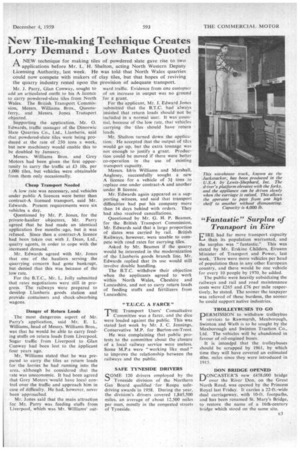New Tile-making Technique Creates Lorry Demand : Low Rates Quoted
Page 47

If you've noticed an error in this article please click here to report it so we can fix it.
A NEW technique for making tiles of powdered slate gave rise to two I-1 applications before Mr. L. H. Shelton, acting North Western Deputy Licensing Authority, last week. He was told that North Wales quarries could now compete with makers of clay tiles, but that hopes of reviving the quarry industry rested upon the provision of adequate transport.
Mr. J. Parry, Glan Conway, sought to add an articulated outfit to his A licence to carry powdered-slate tiles from North Wales. The British Transport Commission, Messrs. Williams Bros., Queensferry, and Messrs. Jones Transport objected.
Supporting the application, Mr. 0. Edwards, traffic manager of the Dinorwic Slate Quarries Co., Ltd., Llanberis, said that powdered-slate tiles were being produced at the rate of 250 tons a week, but new machinery would enable this to he doubledby January.
Messrs. Williams Bros. and Grey Motors had been given the first opportunity to carry the traffic at £3 10s. per 1,000 tiles, but vehicles were obtainable from them only occasionally.
Cheap Transport Needed A low rate was necessary, and vehicles under public A licences were better than contract-A licensed transport, said Mr. Edwards. Present requirements were six vehicles a day.
Questioned by Mr. P. Jones, for the private-haulier objectors, Mr. Parry agreed that he had made an identical application five months ago, but it was refused. Since then a contract-A licence had been taken out with J. Dean, Ltd.,' quarry agents, in order to cope with the increased demand.
Mr. Edwards agreed with Mr. Jones that one of the hauliers serving the quarrying concern had gone bankrupt, but denied that this was because of the low rate.
For the B.T.C., Mr. L. Jolly submitted that rates negotiations were still in progress. The railways were prepared to develop Llanberis goods station and provide containers and shock-absorbing wagons.
Danger of Return Loads The most dangerous aspect of Mr. Parry's application, said Mr. E. L. Williams, head of Messrs, William's Bros., was that he would be able to carry feeding stuffs on return loads from Liverpool. Sugar traffic from Liverpool to Glan Conway had been lost to the applicant four years ago.
Mr. Williams stated that he was prepared to carry the tiles as return loads for the lorries he had running into the area, .although he considered that the rate was uneconomic. It had been agreed that Grey Motors would have local control over the traffic and approach him in case of difficulty. He had, however, never been approached.
Mr. Jones said that the main attraction for Mr. Parry was feeding stuffs from Liverpool, which was Mr. Williams' out
ward traffic. Evidence from one .custorner of an increase in output was no ground for a grant.
For the applicant, Mr. J. Edward Jones submitted that the B.T.C. had always insisted that return loads should not be included in a normal user. It was essential, because of the low rate, that vehicles carrying the tiles should have return loads, Mr. Shelton turned down the application. He accepted that the output of tiles would go up, but the extra tonnage was not enough to justify a grant. Production could be moved if there were better co-operation in the use of existing transport capacity.
Messrs. Idris Williams and Marshall. Anglesey, successfully sought a new A licence for a vehicle of 31 tons to replace one under contract-A and another under B licence.
Mr. Edwards again appeared as a supporting witness, and said that transport difficulties had put his company more than 14 days behind with orders. They had also received cancellations.
Questioned by Mr. G. H. P. Beames, for the British Transport Commission, Mr. Edwards said that a large proportion of slates was carried by rail. British Railways, however, were unable to compete with road rates for carrying tiles.
Asked by Mr. Beames if the quarry would be interested in the modernization of the Llanberis goods branch line, Mr. Edwards replied that its use would still involve double handling.
The B.T.C. withdrew their objection when the applicants agreed to work within North Wales, Cheshire and Lancashire. and not to carry return loads of feeding stuffs and fertilizers from Lancashire.
"T.U.C.C. A FARCE"
THE Transport Users' Consultative Committee was farce, arid the dice were loaded against the public. This was stated last week by Mr. J. C. Jennings, Conservative M.P. for Burton-on-Trent.
He was complaining that public protests to the committee about the closure of a local railway service were useless. Some M.P.s were "working like mad" to improve the relationship between the railways and the public.
SAFE TYNESIDE DRIVERS
SOME 120 drivers employed by the Tyneside division of the Northern Gas Board qualified for Rospa safedriving awards in 1958. During the year, the division's drivers covered 1,845,500 miles, an average of about 12.500 miles per man, mostly in the congested streets of Tyneside.
























































































































